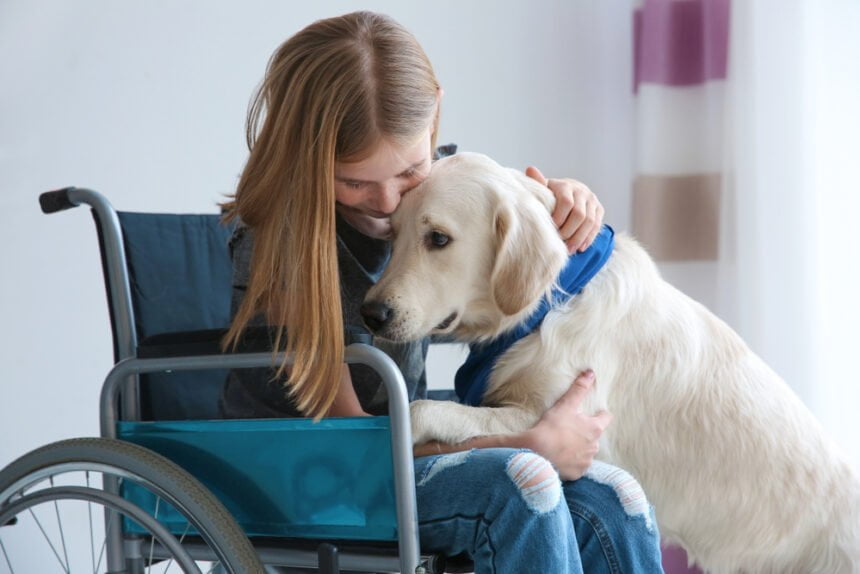People with disabilities are a lot more common than people think. Around 54 million Americans suffer from at least one moderate or serious disability.
Fortunately, having a disability doesn’t have to be unbearable. Adjusting to life with a disability can be tough. We often take our health for granted until it’s gone. Then, we focus on what we’ve lost. But, we can change the way we think about and cope with our disability. We’re still in control of our lives and can improve our independence, empowerment, and outlook. No matter the disability, we can overcome challenges and enjoy a fulfilling life.
We have talked about some of the implements that people with disabilities have used, including wheelchairs. However, we haven’t talked as much about the benefits of using service dogs.
Service Dogs Offer Many Benefits for People Struggling with Disabilities
The American with Disabilities Act is a federal law that protects people with disabilities. This law allows individuals with disabilities to have a service dog. Service dogs can assist in various ways. The ADA defines a service animal as a dog trained to perform tasks for the benefit of an individual with a disability.
Since these dogs are recognized under this law, employers need to allow them to help their employees with disabilities and places of business must accommodate customers with them. Other animals, whether trained or untrained, are not considered service animals. Therefore, you unfortunately cannot use a cat or other animal to help with daily functions and expect the same legal protections. The tasks performed by a service animal must be related to the individual’s disability. Service dogs are not the same as pets or emotional support animals. Those with service dogs have specific permissions that do not apply to those with pets or emotional support animals.
Service dogs are more than just loyal companions; they are life-changing allies for individuals with disabilities. These remarkable canine partners possess the unique ability to empower and assist people in their daily lives, enabling them to overcome challenges and embrace newfound independence. In this blog post, we will delve into the world of service dogs and explore how they play a vital role in transforming the lives of individuals with disabilities.
Understanding Service Dogs and Their Role
Service dogs play a critical role in assisting individuals with disabilities, providing them with support, independence, and increased mobility. It is essential to have a clear understanding of what service dogs are and how they are trained to fulfil their invaluable roles.
A service dog is specifically trained to perform tasks that mitigate the impact of a person’s disability. These tasks can vary depending on the type of disability and the specific needs of the individual. For instance, service dogs can be trained to guide individuals who are blind or visually impaired, alert individuals who are deaf or hard of hearing to important sounds, or assist individuals with physical disabilities by retrieving items, opening doors, or providing balance and stability. For those seeking more information on “how to make my dog a service dog,” it is recommended to consult with qualified trainers or organizations that specialize in service dog training to ensure the best outcome for both the dog and the individual with disabilities.
It is important to note that not all dogs are suitable for becoming service dogs. The selection process is meticulous, taking into account factors such as temperament, health, and the dog’s natural inclination to perform tasks. Breeds commonly chosen for service dog work include Labrador Retrievers, Golden Retrievers, German Shepherds, and Standard Poodles, among others. However, breed alone does not guarantee a dog’s suitability; individual temperament and trainability are equally crucial considerations.
In addition to their specialized training, service dogs develop a unique bond with their handlers. This bond is based on trust, mutual respect, and effective communication. The handler relies on the service dog for assistance and support while the dog looks to the handler for guidance and cues. This partnership is the cornerstone of the successful working relationship between a service dog and its handler.
The Impact of Service Dogs on Independence
Service dogs have a profound impact on the independence of individuals with disabilities. Through their specialized training and assistance, service dogs enable greater autonomy in daily activities and enhance the overall quality of life.
Service dogs assist individuals with disabilities in various ways, depending on their specific needs. They can provide mobility support by guiding individuals with visual impairments, offering balance and stability to those with physical disabilities, and retrieving objects or opening doors. These tasks empower individuals to navigate their surroundings and accomplish daily tasks with increased confidence and independence.
Furthermore, service dogs are trained to alert individuals to important sounds, such as alarms or approaching vehicles, benefiting individuals who are deaf or hard of hearing. This heightened awareness contributes to their safety and autonomy in various environments.
Beyond the physical assistance they provide, service animals offer emotional support and companionship. They can help individuals manage anxiety, depression, and PTSD by providing comfort, reassurance, and a sense of security. The presence of a service dog can significantly reduce stress levels and promote emotional well-being, fostering a more independent and fulfilling life.
By promoting independence and self-reliance, service dogs help individuals with disabilities overcome barriers and participate more fully in society. These remarkable animals not only enhance daily living activities but also serve as catalysts for social integration, breaking down stigmas and facilitating connections with others.
In Summary
Service dogs are life-changing companions that empower individuals with disabilities, enhancing their independence and well-being. These remarkable animals provide invaluable assistance, enabling individuals to navigate daily life with confidence and ease. Through their specialized training, service dogs not only perform physical tasks but also offer emotional support and companionship, fostering a sense of security and connection.
The bond between a service dog and its handler is built on trust and unwavering loyalty, creating a unique partnership that enhances the lives of both. These exceptional dogs are legally recognized as working animals, affording them and their handlers certain rights and protections.
Service dogs break down barriers and promote social integration, helping individuals overcome stigmas and fostering a sense of belonging in their communities. Their dedication and unconditional love are truly transformative.






